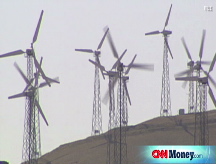Oil prices fall below $43
Investors are skeptical that a possible OPEC cut could raise prices, while a bailout for the U.S. auto industry nears.
NEW YORK (CNNMoney.com) -- Oil prices broke lower Tuesday, after rallying nearly $3 a barrel the day before, as investors worried that a possible OPEC production cut next week may not be enough to sustain prices during the global economic downturn.
U.S. crude for January 2009 delivery fell $1.21 to settle at $42.50 a barrel in New York. On Monday, the price of oil rose $2.90 to $43.71 a barrel.
Many investors believe that the Organization of Petroleum Exporting Countries, an international trade cartel whose members produce about 40% of the world's oil, could announce a coordinated production cut at its Dec. 17 meeting in Algeria.
But a cut in production has been largely expected, and some worry the group may not be able to counter concern about falling demand.
Demand outlook for 2009, as well as the troubles of oil-reliant economies such as OPEC members Iran and Venezuela, make it very difficult for the group to cut production enough to raise prices, according to Schork Group oil analyst Stephen Schork, who attends OPEC conferences.
"Without windfall [oil] profits, they are burning through their cash," said Schork. "There's very little OPEC can do."
On Monday, OPEC President Chakib Khelil told the Associated Press that the oil market could expect to see a "severe" cut in production levels.
Khelil did not say how how much the organization would pledge to cut.
OPEC Secretary General Abdalla Salem El-Badri said last week the ideal price for crude was between $70 a barrel to $90 a barrel, according to Dow Jones.
"Anything less than [a] 3 million [cut] is not going to move the price up," said Jim Williams, an energy economist with analysis firm WTRG Economics in Arkansas.
The organization already pledged to cut 1.5 million barrels per day at an emergency meeting in October, though there have been some concerns among investors that OPEC members were not meeting their reduction quotas.
Global demand: As the world's largest economies slow or contract, investors are worried that consumers and businesses will cut back on the use of petroleum-based fuels - often the first area of spending to be reduced when money is tight.
The export-based economy of Japan has been under intense pressure as the U.S., one of its primary customers, has been in recession for about a year.
Oil prices have fallen more than $100 a barrel since hitting a record high of $147.27 in July, which had been a boon for oil producers, as investors have been concerned about slowing demand.
U.S. automakers: Concerns that a large section of the economy of the United States, the world's largest oil consumer, could disintegrate were eased somewhat, however.
Late Monday, the White House began reviewing a Congressional proposal to loan $15 billion to U.S. automakers that could save the country's auto industry from immediate collapse. The aim is to reach an agreement so Congress can vote on the bill this week in a lame-duck session.
The U.S. auto industry employs about 2 million people nationwide, according to the Center for Automotive Research, which includes workers at General Motors (GM, Fortune 500), Ford (F, Fortune 500) and Chrysler, as well as dealers and parts manufacturers.
An auto bailout could lend "psychological support" to oil, according to Williams.
Investors are awaiting a government report on U.S. energy inventories, scheduled for release Wednesday, that could give clues to U.S. demand.
Analysts expect the government to report a 2.7 million barrel buildup of crude supplies for last week, according to a poll conducted by research firm Platts.
Gasoline supplies should rise by 1.4 million barrels, according to analysts, and the stockpile of distillates, which are used to make diesel fuel and heating oil, should see a 1.6 million decline. ![]()




